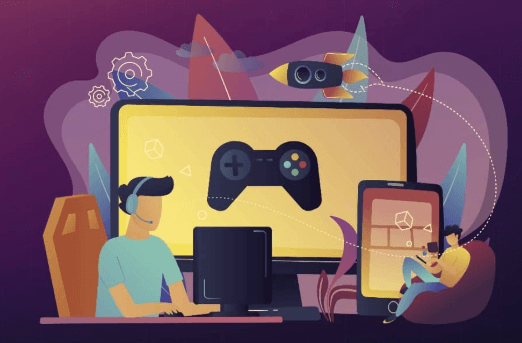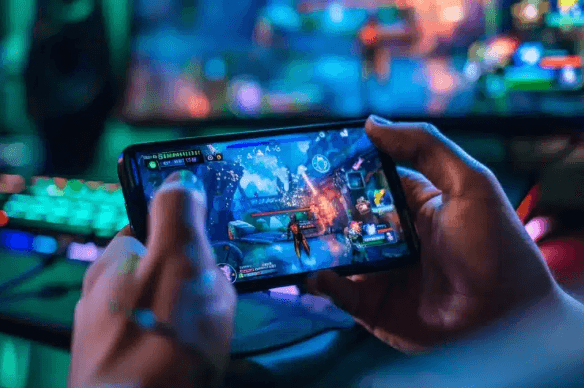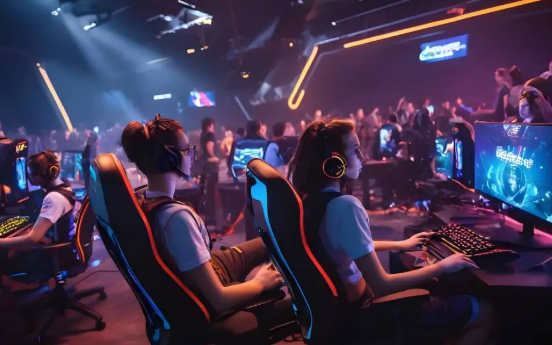The Evolution and Impact of Multiplayer Online Games

Multiplayer online games have dramatically transformed the gaming world, reshaping how players interact with each other and experience entertainment. From humble beginnings in arcades to becoming an essential part of global culture, the journey of multiplayer online gaming reflects not just technological advancements but also shifting social dynamics. In this article, we’ll explore the history, evolution, and lasting impact of multiplayer online games.
1. Introduction to Multiplayer Online Games
Defining Multiplayer Online Games
Multiplayer online games (MOGs) are video games that allow players to connect over the internet to play together in virtual worlds. These games can range from cooperative experiences to competitive ones, and often feature large, persistent online environments where players interact in real-time. What sets MOGs apart from traditional single-player games is their capacity to foster shared experiences among people from all over the world.
The Rise of Online Gaming Culture
With the advent of the internet, gaming transitioned from being a solo pursuit to a communal experience. Early multiplayer games like “Doom” and “Warcraft” introduced gamers to the concept of playing with others, albeit in relatively small, localized settings. As technology improved, the scope of multiplayer online games expanded, creating the online gaming culture that has become a significant part of global entertainment.
See also: 23azo
2. The Early Years of Multiplayer Games
From LAN Parties to Early Online Communities
Before broadband internet became widely available, multiplayer gaming often took place in local area networks (LAN) or over dial-up connections. LAN parties were the hallmark of the late ’90s and early 2000s, where groups of friends would gather in one place to play games like “Quake” or “Counter-Strike.” These were some of the first instances where online gaming communities were formed, albeit on a smaller scale.
Pioneering Titles that Shaped the Industry
The late 1990s and early 2000s saw the launch of several key titles that laid the foundation for multiplayer online gaming as we know it today. Games like “StarCraft,” “Warcraft III,” and “Diablo II” set the stage for what would become a global phenomenon. These games offered players the ability to connect over the internet and participate in competitive or cooperative gameplay.
3. The Technological Advancements that Enabled Online Gaming
Broadband Internet and Faster Connections
The explosion of online gaming wouldn’t have been possible without the development of broadband internet, which replaced dial-up as the primary means of connecting to the web. Faster internet speeds allowed for smoother, more stable online gameplay, paving the way for more complex games with large player bases.
Advancements in Game Servers and Hosting
In the early days, multiplayer games required players to host their own servers, which could be prone to instability and lag. Over time, dedicated game servers and professional hosting services emerged, providing players with consistent and reliable access to game worlds. This shift allowed games to scale to larger audiences and provide persistent worlds that players could return to anytime.
4. The Evolution of Game Genres in Online Multiplayer
From First-Person Shooters to Massively Multiplayer Online Role-Playing Games (MMORPGs)
Initially, multiplayer online games were dominated by first-person shooters (FPS), where players battled each other in fast-paced action. However, the genre began to evolve with the introduction of MMORPGs like “World of Warcraft.” These games offered expansive worlds with role-playing elements, quest systems, and thousands of players interacting simultaneously. The MMORPG genre became a cornerstone of the online gaming community.
The Rise of Battle Royale and MOBA Games
In the 2010s, new genres emerged, most notably Battle Royale and Multiplayer Online Battle Arenas (MOBAs). Titles like “Fortnite” and “PUBG” ushered in the Battle Royale genre, where players fight until only one remains. Meanwhile, games like “League of Legends” and “Dota 2” popularized the MOBA genre, which involves strategic team-based gameplay and has become one of the most competitive forms of gaming.
5. Social Interaction and Community Building
Guilds, Clans, and Esports Teams
One of the defining features of multiplayer online games is the sense of community they create. Players form guilds, clans, and esports teams, collaborating to complete challenges or compete in tournaments. These groups offer social connections, leadership opportunities, and a sense of belonging, often extending beyond the game into real-world friendships and networks.
Social Features in Games: Chat, VoIP, and Streaming Platforms
Multiplayer games have evolved to include a variety of social features that enhance player interaction. In-game chat systems, voice-over-IP (VoIP) tools like Discord, and live streaming platforms like Twitch have allowed gamers to communicate with each other, share their experiences, and build communities around their favorite games.
6. The Role of Multiplayer Online Games in Esports
The Emergence of Competitive Gaming
Competitive gaming, or esports, is a significant offshoot of multiplayer online games. Esports competitions, such as “The International” for Dota 2 or the “League of Legends World Championship,” attract millions of viewers and offer multi-million dollar prize pools. This transformation from casual play to professional competition has helped legitimize gaming as a form of entertainment.
Esports as a Professional Industry
Today, esports is a multi-billion-dollar industry. Players, coaches, analysts, and streamers can make careers out of competitive gaming, with sponsorships, streaming revenue, and tournament winnings fueling the sector. Esports has even found a place in mainstream media, with games like “Overwatch” being featured in traditional sports channels and news outlets.
7. The Psychological Impact of Online Multiplayer Games
Socialization and Loneliness in Virtual Worlds
While online games provide a platform for social interaction, they can also present psychological challenges. Some players become overly absorbed in online worlds, leading to feelings of loneliness or isolation. Others may struggle with the pressure of competing in highly competitive environments, which can affect their mental health.
The Effects of Online Competition and Toxicity
One of the dark sides of multiplayer gaming is the emergence of toxicity within communities. Competitive games, especially in genres like MOBAs and first-person shooters, can lead to aggressive behavior, harassment, and trolling. The phenomenon of “toxic” gaming cultures has led to efforts from developers to improve moderation and create safer environments.
8. The Economic Impact of Multiplayer Online Games
Revenue Streams in Online Games: Microtransactions, Subscriptions, and Advertisements
Monetization in multiplayer online games has evolved significantly. Initially, many games relied on a one-time purchase price, but today’s online games often feature microtransactions, subscriptions, and in-game advertisements. The introduction of skins, loot boxes, and other cosmetic items has helped create a massive revenue stream for game developers.
The Rise of Gaming-Related Careers and Industries
The gaming industry has spawned a wide range of career opportunities. Game designers, developers, streamers, and professional players all contribute to the ecosystem. As gaming becomes more mainstream, more job opportunities arise in fields like game marketing, esports management, and content creation.
9. Multiplayer Online Games and Globalization
How Online Games Bridge Cultural and Geographic Gaps
Multiplayer online games offer a unique platform for players from different countries and cultures to come together. Through games, players learn to communicate, collaborate, and compete with individuals from various backgrounds, fostering a sense of global community.
The Role of Global Events and Competitions in Building a Unified Gaming Culture
International esports tournaments and online events have become crucial in bringing together players from across the world. These events help solidify the concept of a global gaming culture, with millions of fans following competitions that are broadcast worldwide.
10. The Future of Multiplayer Online Games
Virtual Reality and Augmented Reality in Online Gaming
Looking ahead, multiplayer online games are poised to integrate emerging technologies like Virtual Reality (VR) and Augmented Reality (AR). These technologies will allow players to immerse themselves fully in virtual worlds, making online gaming even more lifelike and engaging.
The Role of Artificial Intelligence in Enhancing Gameplay
Artificial Intelligence (AI) is already influencing online gaming. From improving non-playable characters (NPCs) to creating more dynamic and intelligent in-game experiences, AI is set to revolutionize multiplayer games, making them more responsive and adaptive to player behavior.
11. Challenges Facing Multiplayer Online Games
Server Issues, Lag, and Technical Problems
Despite technological advancements, multiplayer games still face issues like server downtime, lag, and connectivity problems. These challenges can disrupt gameplay, frustrating players and negatively impacting the overall gaming experience.
Game Moderation and the Fight Against Cheating and Toxic Behavior
With large player bases come larger issues of cheating, griefing, and toxic behavior. Developers and moderators continue to improve systems to combat these issues, but they remain a persistent challenge in the gaming community.
12. Ethical Considerations in Multiplayer Online Games
The Issue of Player Privacy and Data Security
As multiplayer online games collect vast amounts of personal data, issues around player privacy and data security have become a significant concern. Developers must ensure that data is protected and that players are informed about how their information is used.
Monetization and Fairness in Online Games
The implementation of microtransactions and loot boxes has sparked debate about fairness in gaming. Critics argue that these practices can create pay-to-win situations, while others defend them as necessary for sustaining the gaming industry.
13. Impact on Traditional Forms of Entertainment
The Rise of Streaming and Influencer Culture in Gaming
Platforms like Twitch and YouTube have transformed the way people engage with games. Gamers can now watch their favorite players in action, learn new strategies, and even interact with influencers. This shift has created a new wave of digital entertainers who generate income through sponsorships and fan support.
Online Games vs. Traditional Media
The rise of online gaming has led to a shift in entertainment preferences. Younger audiences, in particular, are choosing gaming over traditional forms of entertainment like television and movies, prompting changes in the media landscape.
14. Educational and Therapeutic Benefits of Multiplayer Online Games
Gaming as a Learning Tool
Games are increasingly being used as educational tools. Multiplayer games can teach valuable life skills like teamwork, strategic thinking, and problem-solving. Games like “Minecraft” have even been used in classrooms to engage students and promote creativity.
Using Multiplayer Games for Therapy and Rehabilitation
There is growing interest in using multiplayer games for therapeutic purposes. Virtual environments provide a safe space for therapy, where patients can engage in activities that promote mental well-being or recovery from injury.
15. Conclusion
The Lasting Influence of Multiplayer Online Games
The evolution of multiplayer online games has reshaped not only the gaming industry but also the way we interact socially and economically. As technology continues to advance, the influence of online games will only grow, offering new opportunities and challenges for players, developers, and communities worldwide.
Frequently Asked Questions (FAQs)
1. What defines a multiplayer online game?
A multiplayer online game (MOG) is a video game that allows multiple players to connect and interact in real-time over the internet. These games can include various genres, such as shooters, role-playing, strategy, and sports games.
2. How did online gaming evolve over time?
Online gaming began with LAN parties and dial-up connections before progressing to broadband internet, which enabled larger, more immersive online worlds. The rise of new game genres and competitive esports helped to establish online gaming as a mainstream entertainment form.
3. What is the significance of esports in online gaming?
Esports has transformed competitive gaming into a professional industry, with tournaments, sponsorships, and significant financial rewards. It has also helped solidify gaming as a form of entertainment on par with traditional sports.
4. How do multiplayer games impact players socially?
Multiplayer games allow players to interact with others, build communities, and form social connections. However, they can also contribute to feelings of isolation and issues like toxic behavior and harassment.
5. What are the future trends in multiplayer online games?
Future trends include the integration of Virtual Reality (VR) and Augmented Reality (AR) into online games, along with the use of Artificial Intelligence (AI) to enhance gameplay. These advancements are expected to make multiplayer experiences even more immersive and engaging.
6. What challenges do multiplayer games face?
Multiplayer games face challenges like server issues, lag, cheating, and toxicity within communities. Developers continually work on improving game moderation and ensuring that players have a smooth, fair experience.



